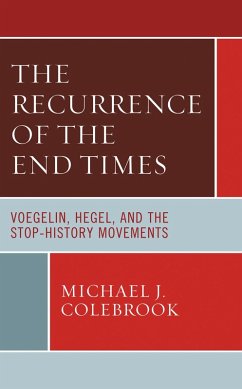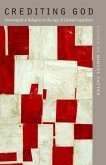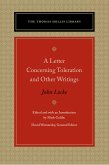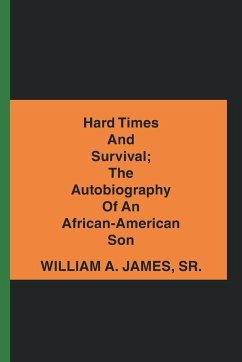- Broschiertes Buch
- Merkliste
- Auf die Merkliste
- Bewerten Bewerten
- Teilen
- Produkt teilen
- Produkterinnerung
- Produkterinnerung
The Recurrence of the End Times: Voegelin, Hegel, and the Stop-History Movements explores the deep connection between modern political ideologies and the secular eschatological hopes and dreams of a post-Christian society.
Andere Kunden interessierten sich auch für
![The Idol of Our Age: How the Religion of Humanity Subverts Christianity The Idol of Our Age: How the Religion of Humanity Subverts Christianity]() Daniel J. MahoneyThe Idol of Our Age: How the Religion of Humanity Subverts Christianity17,99 €
Daniel J. MahoneyThe Idol of Our Age: How the Religion of Humanity Subverts Christianity17,99 €![Crediting God: Sovereignty and Religion in the Age of Global Capitalism Crediting God: Sovereignty and Religion in the Age of Global Capitalism]() Crediting God: Sovereignty and Religion in the Age of Global Capitalism53,99 €
Crediting God: Sovereignty and Religion in the Age of Global Capitalism53,99 €![Walk In It Walk In It]() David R. SassamanWalk In It15,99 €
David R. SassamanWalk In It15,99 €![Ethics in an Age of Technology Ethics in an Age of Technology]() Ian G BarbourEthics in an Age of Technology23,99 €
Ian G BarbourEthics in an Age of Technology23,99 €![A Letter Concerning Toleration and Other Writings A Letter Concerning Toleration and Other Writings]() John LockeA Letter Concerning Toleration and Other Writings16,99 €
John LockeA Letter Concerning Toleration and Other Writings16,99 €![Hard Times and Survival; the Autobiography of an African-American Son Hard Times and Survival; the Autobiography of an African-American Son]() William A. James Sr.Hard Times and Survival; the Autobiography of an African-American Son35,99 €
William A. James Sr.Hard Times and Survival; the Autobiography of an African-American Son35,99 €![A Philosophy of Christian Materialism A Philosophy of Christian Materialism]() Christopher BakerA Philosophy of Christian Materialism74,99 €
Christopher BakerA Philosophy of Christian Materialism74,99 €-
-
-
The Recurrence of the End Times: Voegelin, Hegel, and the Stop-History Movements explores the deep connection between modern political ideologies and the secular eschatological hopes and dreams of a post-Christian society.
Hinweis: Dieser Artikel kann nur an eine deutsche Lieferadresse ausgeliefert werden.
Hinweis: Dieser Artikel kann nur an eine deutsche Lieferadresse ausgeliefert werden.
Produktdetails
- Produktdetails
- Verlag: Lexington Books
- Seitenzahl: 190
- Erscheinungstermin: 15. Februar 2025
- Englisch
- ISBN-13: 9781793651365
- ISBN-10: 1793651361
- Artikelnr.: 71811039
- Herstellerkennzeichnung
- Produktsicherheitsverantwortliche/r
- Europaallee 1
- 36244 Bad Hersfeld
- gpsr@libri.de
- Verlag: Lexington Books
- Seitenzahl: 190
- Erscheinungstermin: 15. Februar 2025
- Englisch
- ISBN-13: 9781793651365
- ISBN-10: 1793651361
- Artikelnr.: 71811039
- Herstellerkennzeichnung
- Produktsicherheitsverantwortliche/r
- Europaallee 1
- 36244 Bad Hersfeld
- gpsr@libri.de
Michael J. Colebrookteaches in the World Languages and Religious Studies Department at St. John's High School. .
Part I: General Introduction to the End of History Controversy
Chapter 1: The End of History, Identity Politics, and Transcendence
Chapter 2: The Origins of a Hegelian Misunderstanding
Part II: Hegel and the Crisis of Christian Salvation History
Chapter 3: Universal History Reimagined
Chapter 4: Elements of Historiogenesis
Chapter 5: Tradition-Bound Historiogenesis: Christian Historia Sacra
Chapter 6: Gnostic Historiogenesis: The Case of Hegel
Chapter 7: Historical Mankind and Historical Traditions
Part III: Intentionality and the Historical Process
Chapter 8: Voegelin on Human Consciousness
Chapter 9: Kojève's Hegel on Time and History
Chapter 10: Voegelin on the Problem of Time and the "Stop-History"
Movements
Part IV: Hegel's Eclipse of Reality
Chapter 11: Hegel as Psychiatric Case Study?
Chapter 12: Voegelin and R.D. Laing on the Divided Self
Chapter 13: Does Hegel Manifest Schizoid Symptoms?
Chapter 14: Shortcomings in Laing's Theory of the Two Selves
Chapter 15: Ontological Insecurity and Von Doderer's Analysis of Second
Realities
Chapter 16: Voegelin on Hegel's Second Reality
Chapter 17: Voegelin's Kojèvian "Code" as an Inadequate Interpretation of
Hegel's System
Part V: Kojève's Hegel: Deliberate Falsification or Valid Exegesis?
Chapter 18: Possible Interpretations of End of History Thesis
Chapter 19: Kojève on the Present and Future
Chapter 20: How Valid Are Kojève's Observations on the Modern World?
Chapter 21: Why Hegel's Rational State is neither Universal nor Homogeneous
Chapter 22: What is Hegel's Position on the End of History?
Chapter 23: Hegel on Transcendence and the "Beyond"
Conclusion: Transcendence, Death, and the Search for Order
Chapter 1: The End of History, Identity Politics, and Transcendence
Chapter 2: The Origins of a Hegelian Misunderstanding
Part II: Hegel and the Crisis of Christian Salvation History
Chapter 3: Universal History Reimagined
Chapter 4: Elements of Historiogenesis
Chapter 5: Tradition-Bound Historiogenesis: Christian Historia Sacra
Chapter 6: Gnostic Historiogenesis: The Case of Hegel
Chapter 7: Historical Mankind and Historical Traditions
Part III: Intentionality and the Historical Process
Chapter 8: Voegelin on Human Consciousness
Chapter 9: Kojève's Hegel on Time and History
Chapter 10: Voegelin on the Problem of Time and the "Stop-History"
Movements
Part IV: Hegel's Eclipse of Reality
Chapter 11: Hegel as Psychiatric Case Study?
Chapter 12: Voegelin and R.D. Laing on the Divided Self
Chapter 13: Does Hegel Manifest Schizoid Symptoms?
Chapter 14: Shortcomings in Laing's Theory of the Two Selves
Chapter 15: Ontological Insecurity and Von Doderer's Analysis of Second
Realities
Chapter 16: Voegelin on Hegel's Second Reality
Chapter 17: Voegelin's Kojèvian "Code" as an Inadequate Interpretation of
Hegel's System
Part V: Kojève's Hegel: Deliberate Falsification or Valid Exegesis?
Chapter 18: Possible Interpretations of End of History Thesis
Chapter 19: Kojève on the Present and Future
Chapter 20: How Valid Are Kojève's Observations on the Modern World?
Chapter 21: Why Hegel's Rational State is neither Universal nor Homogeneous
Chapter 22: What is Hegel's Position on the End of History?
Chapter 23: Hegel on Transcendence and the "Beyond"
Conclusion: Transcendence, Death, and the Search for Order
Part I: General Introduction to the End of History Controversy
Chapter 1: The End of History, Identity Politics, and Transcendence
Chapter 2: The Origins of a Hegelian Misunderstanding
Part II: Hegel and the Crisis of Christian Salvation History
Chapter 3: Universal History Reimagined
Chapter 4: Elements of Historiogenesis
Chapter 5: Tradition-Bound Historiogenesis: Christian Historia Sacra
Chapter 6: Gnostic Historiogenesis: The Case of Hegel
Chapter 7: Historical Mankind and Historical Traditions
Part III: Intentionality and the Historical Process
Chapter 8: Voegelin on Human Consciousness
Chapter 9: Kojève's Hegel on Time and History
Chapter 10: Voegelin on the Problem of Time and the "Stop-History"
Movements
Part IV: Hegel's Eclipse of Reality
Chapter 11: Hegel as Psychiatric Case Study?
Chapter 12: Voegelin and R.D. Laing on the Divided Self
Chapter 13: Does Hegel Manifest Schizoid Symptoms?
Chapter 14: Shortcomings in Laing's Theory of the Two Selves
Chapter 15: Ontological Insecurity and Von Doderer's Analysis of Second
Realities
Chapter 16: Voegelin on Hegel's Second Reality
Chapter 17: Voegelin's Kojèvian "Code" as an Inadequate Interpretation of
Hegel's System
Part V: Kojève's Hegel: Deliberate Falsification or Valid Exegesis?
Chapter 18: Possible Interpretations of End of History Thesis
Chapter 19: Kojève on the Present and Future
Chapter 20: How Valid Are Kojève's Observations on the Modern World?
Chapter 21: Why Hegel's Rational State is neither Universal nor Homogeneous
Chapter 22: What is Hegel's Position on the End of History?
Chapter 23: Hegel on Transcendence and the "Beyond"
Conclusion: Transcendence, Death, and the Search for Order
Chapter 1: The End of History, Identity Politics, and Transcendence
Chapter 2: The Origins of a Hegelian Misunderstanding
Part II: Hegel and the Crisis of Christian Salvation History
Chapter 3: Universal History Reimagined
Chapter 4: Elements of Historiogenesis
Chapter 5: Tradition-Bound Historiogenesis: Christian Historia Sacra
Chapter 6: Gnostic Historiogenesis: The Case of Hegel
Chapter 7: Historical Mankind and Historical Traditions
Part III: Intentionality and the Historical Process
Chapter 8: Voegelin on Human Consciousness
Chapter 9: Kojève's Hegel on Time and History
Chapter 10: Voegelin on the Problem of Time and the "Stop-History"
Movements
Part IV: Hegel's Eclipse of Reality
Chapter 11: Hegel as Psychiatric Case Study?
Chapter 12: Voegelin and R.D. Laing on the Divided Self
Chapter 13: Does Hegel Manifest Schizoid Symptoms?
Chapter 14: Shortcomings in Laing's Theory of the Two Selves
Chapter 15: Ontological Insecurity and Von Doderer's Analysis of Second
Realities
Chapter 16: Voegelin on Hegel's Second Reality
Chapter 17: Voegelin's Kojèvian "Code" as an Inadequate Interpretation of
Hegel's System
Part V: Kojève's Hegel: Deliberate Falsification or Valid Exegesis?
Chapter 18: Possible Interpretations of End of History Thesis
Chapter 19: Kojève on the Present and Future
Chapter 20: How Valid Are Kojève's Observations on the Modern World?
Chapter 21: Why Hegel's Rational State is neither Universal nor Homogeneous
Chapter 22: What is Hegel's Position on the End of History?
Chapter 23: Hegel on Transcendence and the "Beyond"
Conclusion: Transcendence, Death, and the Search for Order








